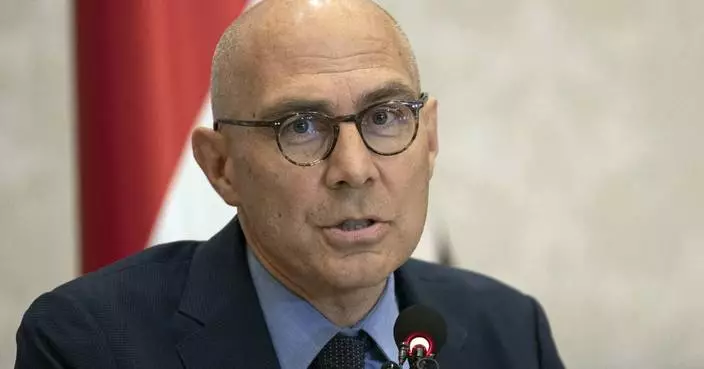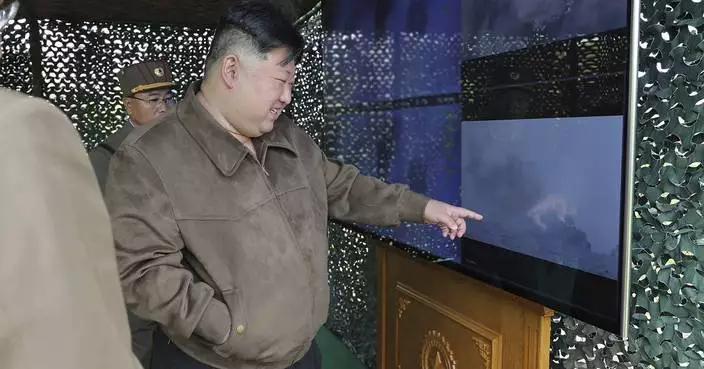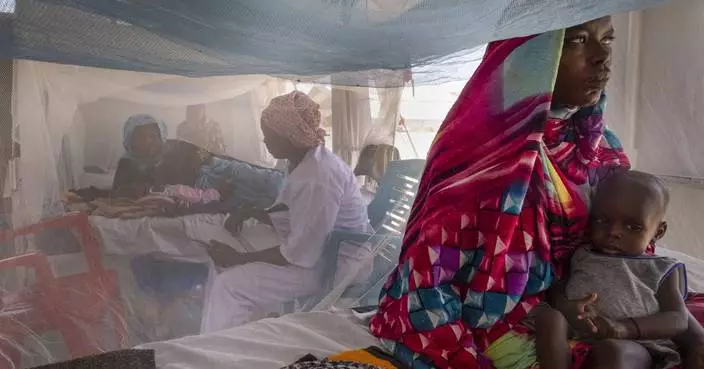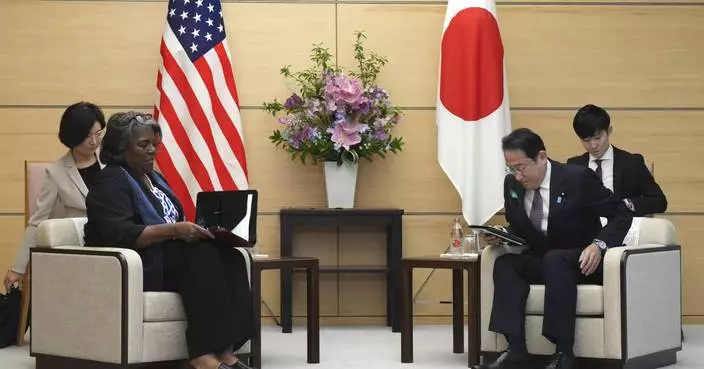Secretary-General Antonio Guterres has strongly rejected claims by five human rights groups that he hasn't condemned the Chinese government's detention of more than a million Muslims in the Xinjiang region, saying he has spoken out forcefully.
"I don't think anyone has been more persistent and more clear in talking to the Chinese authorities in relation to this issue than myself," he told reporters Wednesday. "It is absolutely not true that I've only done discreet diplomacy."
On the contrary, Guterres said that during his visit to Beijing in April, "I not only did raise the issue, but I made it public."
The five rights groups said in a letter to the secretary-general circulated Tuesday that he would make an important contribution to addressing "one of the most pressing human rights issues of our time" by speaking out against China's internment of the Uighurs and members of other predominantly Muslim ethnic groups and calling for the immediate closure of detention camps for them.
The letter was signed by Human Rights Watch, Amnesty International, the International Commission of Jurists, the International Federation for Human Rights and the World Uyghur Conference.
Guterres said he told the Chinese "that it is very important to act in a way that each community feels that their identity is respected and that they belong, at the same time, to the society as a whole."
"There couldn't be a more clear message," he said. "So, if there is an area where I believe I've been doing publicly much more than many other leaders around the world (it) is this."
Guterres said he will continue acting to guarantee that "all human rights in all circumstances are fully respected in that situation."
Does that mean detention centers should be closed?
"It will mean to do everything that is necessary for human rights to be respected," Guterres replied.
Criticism has grown over China's internment of the Uighurs and other Muslims, and Guterres has been criticized previously by human rights groups and some governments for his behind-the-scenes approach and failure to address their plight publicly.
China's government insists the detention sites are "vocational" centers aimed at training and skills development. It has sharply criticized 22 Western countries that called for an end to mass arbitrary detentions and other abuses of Uighurs and other Muslims in the Xinjiang region.
In a report earlier this year to counter criticism of internment camps and other oppressive security in the traditionally Islamic region, China said it had arrested nearly 13,000 people it described as "terrorists" and had broken up hundreds of "terrorist gangs" in Xinjiang since 2014.
The five rights organizations cautioned Guterres "against any action that might lend credence to Beijing's narrative that the unlawful detention of over a million Uighurs and other Muslims is a necessary measure to counter terrorism."
UNITED NATIONS (AP) — Russia on Wednesday vetoed a U.N. resolution sponsored by the United States and Japan calling on all nations to prevent a dangerous nuclear arms race in outer space, calling it “a dirty spectacle” that cherry picks weapons of mass destruction from all other weapons that should also be banned.
The vote in the 15-member Security Council was 13 in favor, Russia opposed and China abstaining.
The resolution would have called on all countries not to develop or deploy nuclear arms or other weapons of mass destruction in space, as banned under a 1967 international treaty that included the U.S. and Russia, and to agree to the need to verify compliance.
U.S. Ambassador Linda Thomas-Greenfield said after the vote that Russian President Vladimir Putin has said Moscow has no intention of deploying nuclear weapons in space.
“Today’s veto begs the question: Why? Why, if you are following the rules, would you not support a resolution that reaffirms them? What could you possibly be hiding,” she asked. “It’s baffling. And it’s a shame.”
Russia’s U.N. Ambassador Vassily Nebenzia dismissed the resolution as “absolutely absurd and politicized,” and said it didn’t go far enough in banning all types of weapons in space.
Russia and China proposed an amendment to the U.S.-Japan draft that would call on all countries, especially those with major space capabilities, “to prevent for all time the placement of weapons in outer space, and the threat of use of force in outer spaces.”
The vote was 7 countries in favor, 7 against, and one abstention and the amendment was defeated because it failed to get the minimum 9 “yes” votes required for adoption.
The U.S. opposed the amendment, and after the vote Nebenzia addressed the U.S. ambassador saying: “We want a ban on the placement of weapons of any kind in outer space, not just WMDs (weapons of mass destruction). But you don’t want that. And let me ask you that very same question. Why?”
He said much of the U.S. and Japan’s actions become clear “if we recall that the U.S. and their allies announced some time ago plans to place weapons … in outer space.”
Nebenzia accused the U.S. of blocking a Russian-Chinese proposal since 2008 for a treaty against putting weapons in outer space.
Thomas-Greenfield accused Russia of undermining global treaties to prevent the spread of nuclear weapons, irresponsibly invoking “dangerous nuclear rhetoric,” walking away from several of its arms control obligations, and refusing to engage “in substantive discussions around arms control or risk reduction.”
She called Wednesday’s vote “a real missed opportunity to rebuild much-needed trust in existing arms control obligations.”
Thomas-Greenfield’s announcement of the resolution on March 18 followed White House confirmation in February that Russia has obtained a “troubling” anti-satellite weapon capability, although such a weapon is not operational yet.
Putin declared later that Moscow has no intention of deploying nuclear weapons in space, claiming that the country has only developed space capabilities similar to those of the U.S.
Thomas-Greenfield said before the vote that the world is just beginning to understand “the catastrophic ramifications of a nuclear explosion in space.”
It could destroy “thousands of satellites operated by countries and companies around the world — and wipe out the vital communications, scientific, meteorological, agricultural, commercial, and national security services we all depend on,” she said.
The defeated draft resolution said “the prevention of an arms race in outer space would avert a grave danger for international peace and security.” It would have urged all countries carrying out activities in exploring and using outer space to comply with international law and the U.N. Charter.
The draft would have affirmed that countries that ratified the 1967 Outer Space Treaty must comply with their obligations not to put in orbit around the Earth “any objects” with weapons of mass destruction, or install them “on celestial bodies, or station such weapons in outer space.”
The treaty, ratified by some 114 countries, including the U.S. and Russia, prohibits the deployment of “nuclear weapons or any other kinds of weapons of mass destruction” in orbit or the stationing of “weapons in outer space in any other manner.”
The draft resolution emphasized “the necessity of further measures, including political commitments and legally binding instruments, with appropriate and effective provisions for verification, to prevent an arms race in outer space in all its aspects.”
It reiterated that the U.N. Conference on Disarmament, based in Geneva, has the primary responsibility to negotiate agreements on preventing an arms race in outer space.
The 65-nation body has achieved few results and has largely devolved into a venue for countries to voice criticism of others’ weapons programs or defend their own. The draft resolution would have urged the conference “to adopt and implement a balanced and comprehensive program of work.”
At the March council meeting where the U.S.-Japan initiative was launched, U.N. Secretary-General António Guterres warned that “geopolitical tensions and mistrust have escalated the risk of nuclear warfare to its highest point in decades.”
He said the movie “Oppenheimer” about Robert Oppenheimer, who directed the U.S. project during World War II that developed the atomic bomb, “brought the harsh reality of nuclear doomsday to vivid life for millions around the world.”
“Humanity cannot survive a sequel to Oppenheimer,” the U.N. chief said.

United States Ambassador and Representative to the United Nations Linda Thomas-Greenfield addresses members of the U.N. Security Council before voting during a meeting on Non-proliferation of nuclear weapons, Wednesday, April 24, 2024 at United Nations headquarters. (AP Photo/Eduardo Munoz Alvarez)

FILE - U.S. Ambassador to United Nations Linda Thomas-Greenfield speaks on Thursday, April 18, 2024, in Tokyo. The U.N. Security Council is set to vote Wednesday, April 24, 2024, on a resolution announced by Thomas-Greenfield, calling on all nations to prevent a dangerous nuclear arms race in outer space. It is likely to be vetoed by Russia. (AP Photo/Eugene Hoshiko, Pool, File)











